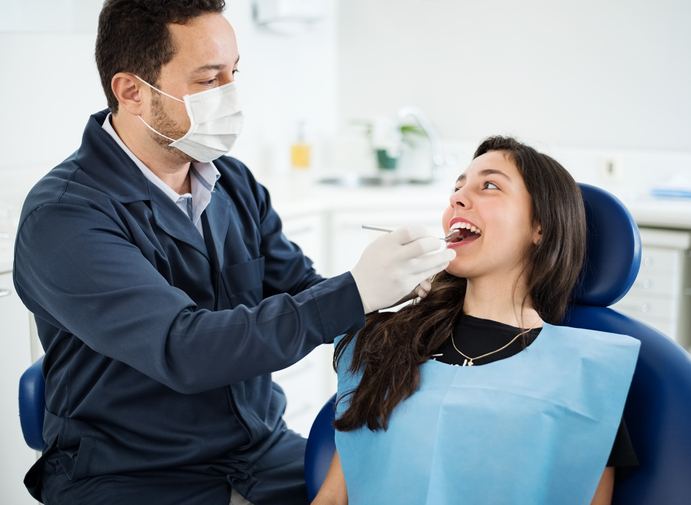
Routine dental visits are an essential part of keeping your teeth and gums healthy and strong. Here’s why.
Having your teeth cleaned regularly is one of the best things you can do to keep your mouth healthy. Unfortunately, people brush off attending appointments because they’re too busy, they’re worried about the cost, or they simply forget. In fact, in 2017, only 58% of those surveyed visited their dentist at least once a year. But why is attending your biannual dental cleanings so important?
The Purpose Of Dental Cleaning
During a dental cleaning, your dental hygienist will deeply clean your teeth, removing tartar and plaque to keep gum disease at bay and reduce the likelihood of tooth decay or loss. Your dentist will be able to notice any early signs of disease or decay and use x-rays to spot any problems that are invisible to the naked eye, including impacted wisdom teeth and infections.
So What Happens When I Miss A Dental Cleaning?
While skipping a dental cleaning may seem trivial, it can be detrimental in the long run. Waiting years between appointments can negatively affect your oral health, as plaque accumulates on your teeth and beneath your gum line constantly — no matter how good you are at brushing. When you neglect your dental health and skip your cleanings, your dentist won’t be able to perform preventative care and checkups to keep your teeth healthy, raising your risk of several oral conditions, including:
Plaque Build-Up: In just two days after formation, plaque will start hardening on your teeth. By day twelve, it will become tartar, which requires a professional to remove. Skipping cleanings can lead to tooth decay, cavities, bad breath, gum disease, and enamel erosion.
Cavities: Caused by frequent snacking, sugary diets, poor oral hygiene, and the resulting plaque accumulation, cavities can cause toothaches, sensitivity, pain, holes, pits, and stains. When you attend your biannual dental appointments, your dentist will notice any early signs of decay and remove plaque and tartar, helping you keep your mouth cavity-free.
Gum Disease: Plaque accumulation can also lead to gingivitis, a mild form of gum disease that’s often accompanied by soreness, bleeding, discoloration, or swelling in the gums. In addition to brushing with an antibacterial toothpaste and rinsing with mouthwash each day, attending regular dental cleanings can reduce your chances of developing gingivitis. At your cleaning, your dentist will thoroughly clean below your gum line and spot any signs of gingivitis before it progresses to periodontitis.
Stains: Frequently drinking red wine, soda, coffee, and black tea can lead to staining. Luckily, you don’t have to cut these drinks out of your diet. Instead, use a straw, drink your cup in one sitting, rinse your mouth with water or mouthwash, and attend your biannual cleaning.
Cracked Or Broken Teeth: At each dental cleaning, your dentist will thoroughly clean your teeth and gums, making you less susceptible to everything from tiny surface-level cracks to those that extend through your gum line. Plus, your dentist will take annual x-rays to locate any structural deficiencies. When you skip your appointment, you’ll miss out on a deep cleaning and a thorough examination, raising your risk of breaking or cracking your teeth.
Other Health Problems: Oral bacteria can cause inflammation, infections, and gum disease and has been linked to pneumonia, heart disease, and endocarditis. Plus, poor oral health can cause eating and sleep disruptions and has been connected to premature births and birth complications.
How Often Should I Schedule Cleanings?
Most people should visit their dentist at least twice a year for cleaning. However, if you frequently experience dental problems, have dry mouth, grind your teeth, or have a history of oral health problems, you may need to attend cleanings more often to keep your mouth in tip-top shape.
What Should I Do Between Cleanings?
While attending your scheduled dental cleanings is an essential part of keeping your mouth healthy, the work doesn’t stop there. Between dental cleanings, brush, floss, rinse with a quality mouthwash, lower your sugar intake, avoid tobacco products, and eat more fruits and vegetables. By having a healthy, balanced diet and being diligent with your daily oral hygiene routine, you can ensure your teeth stay as clean and healthy as possible until your next cleaning.
Schedule A Cleaning
The longer you put off your dental cleaning, the higher your risk of developing cavities, decay, gum disease, or more serious health problems. If you’re due for a dental cleaning, contact us at Espire today.


